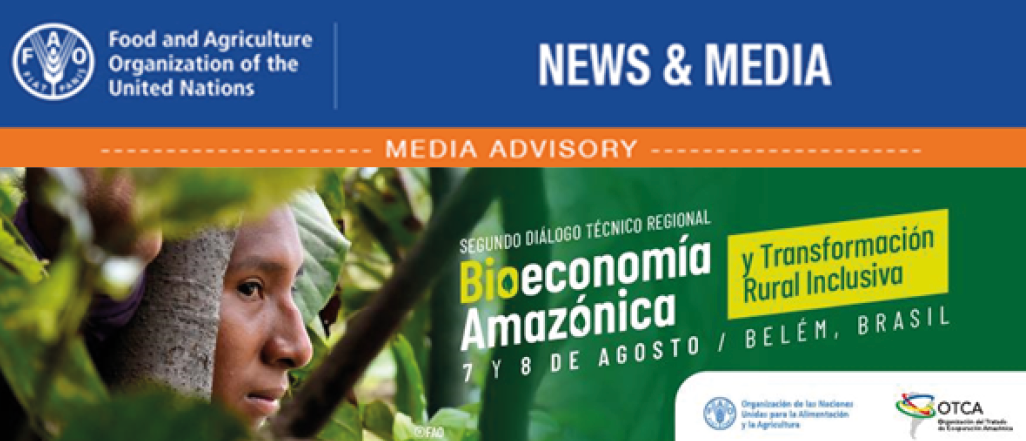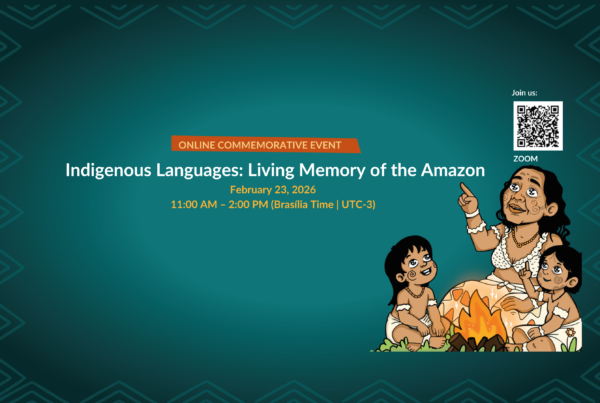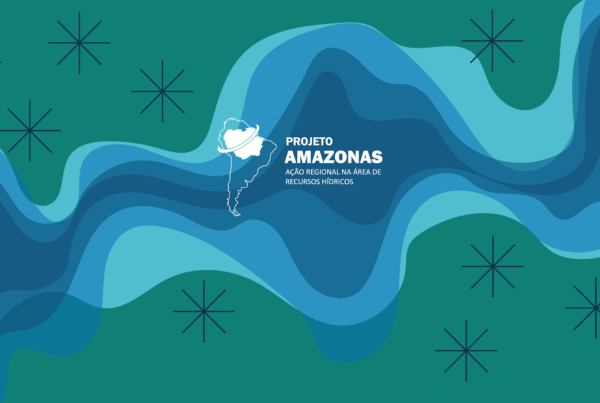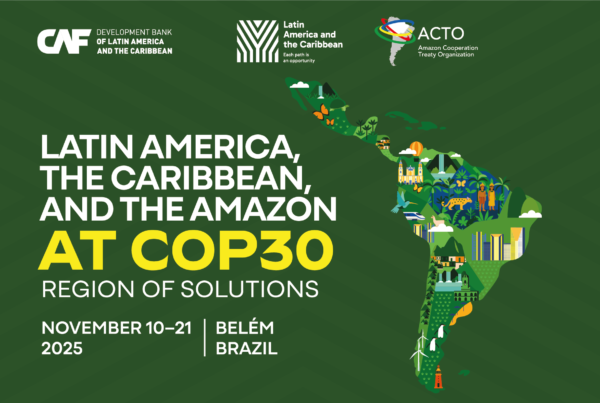One year after signing the Belem Declaration (2023), the Amazon Cooperation Treaty Organization (ACTO) in conjunction with the United Nations Food and Agriculture Organization (FAO) are organizing the technical event called “Second Regional Dialogue on Amazon Bioeconomy and Inclusive Rural Transformation.” This event will take place in Belém, Pará, Brazil, on August 7th and 8th of this year.
This event is the result of a technical collaboration agreement between ACTO and FAO to foster effective cooperation among the eight ACTO member countries (Bolivia, Brazil, Colombia, Ecuador, Guyana, Peru, Suriname, and Venezuela) with the aim of strengthening food security and reducing poverty levels in the Amazon population.
In this context, the second regional technical dialogue on Amazon Bioeconomy and Inclusive Rural Transformation will identify opportunities, emblematic cases, and recurring challenges for adopting an Amazon bioeconomy model that meets the need for inclusive rural transformation where no one is left behind, as established by the Sustainable Development Goals (SDGs), Agenda 2030, emphasizing the achievement of SDG 1 – End Poverty, SDG 2 – Zero Hunger, and SDG 10 – Reduced Inequalities, in accordance with the Belem Declaration (2023) and following up on the Resolutions of the IX Meeting of Foreign Ministers of the Amazon Cooperation Treaty Organization (ACTO).
Context
Numerous scientific studies highlight the essential role of the Amazon in combating the global climate crisis, while also pointing out the multiple environmental risks and socioeconomic losses associated with the ecosystem’s tipping point. Despite this, the potential loss of Amazon forests for the period 2015-2030 is the highest globally, and if these negative trends are confirmed, the economic losses for the accumulated GDP of the Amazon countries could reach $230 billion USD, according to preliminary estimates by the Inter-American Development Bank (IDB).
The Amazon environmental crisis tends to overshadow the socioeconomic challenges and structural social inequalities affecting the local population. In all countries, the Amazon region has higher levels of hunger and poverty compared to national averages. Currently, there are more than 47 million inhabitants in the Amazon region, of which 70% live in urban centers (Padoch, C. et al. 2008; Parry et al. 2014). Additionally, the Amazon is home to over 400 Indigenous Peoples (approximately 2.2 million), as well as multiple traditional communities, such as Afro-descendant communities (Maroons, Quilombolas, etc.), who collectively manage almost 30% of the Amazon and coexist with high levels of poverty, food insecurity, unmet basic needs, and increased violence that threatens their well-being and territories.
In this complex scenario, the concept of Amazon bioeconomy focused on the sustainable use of forest and fishery socio-biodiversity could represent an opportunity to combat hunger and poverty, as well as to improve the living conditions of both rural and urban populations.
To contribute to this purpose, FAO will make available to the eight ACTO member countries the Hand-in-Hand Initiative (MdM), which uses advanced geospatial analysis and models, as well as an approach consistent with establishing strong partnerships, to accelerate the transformation of agri-food systems based on the market, with the aim of increasing income, improving nutritional status and the well-being of poor and vulnerable populations, and strengthening resilience to climate change. The Hand-in-Hand Initiative, launched in 2019, is one of FAO’s flagship programs and one of its main priority program areas.
About the Concept of Bioeconomy
Bioeconomy can be defined as the production, utilization, conservation, and regeneration of biological resources, including related knowledge, science, technology, and innovation, with the aim of providing sustainable solutions (information, products, processes, and services) in and for all economic sectors, thus enabling a transformation towards a sustainable economy (International Advisory Council on Global Bioeconomy, 2020). The cross-cutting nature of bioeconomy offers a unique opportunity to holistically address interconnected social challenges such as food and nutritional security, dependence on fossil resources, resource scarcity, and climate change, while achieving sustainable economic development (FAO, 2022).
FAO leads international work on sustainable and circular bioeconomy through the International Sustainable Bioeconomy Working Group (ISBWG) and actively participates in global debates on sustainable bioeconomy as a member of the International Advisory Council on Global Bioeconomy (IACGB). Although there is no single, agreed-upon definition of this concept in the Latin America and Caribbean region, it has gained special importance both globally and regionally. While this presents some challenges, this conceptual diversity also means opportunities for collaboration and regional and global integration, especially considering the alignment and contribution of bioeconomy to the Sustainable Development Goals (SDGs), Agenda 2030, the Belem Declaration (2023), and particularly the following Resolutions of the IX Meeting of Foreign Ministers of the Amazon Cooperation Treaty Organization (ACTO):
- RES/XIV MRE-OTCA/11 – Amazon Strategy for Food Sovereignty and Nutritional Security;
- RES/XIV MRE-OTCA/23 – Development of a regional cooperation framework in the areas of certification and valorization of Amazon products and incentives for the recognition of environmental and ecosystem services/functions in the context of an economy for sustainable development.
- RES/XIV MRE-OTCA/04 – Institutionalization of the Amazon Regional Observatory (ORA) in the structure of ACTO, with the strengthening of its various modules on economic, social, environmental, and cultural themes.
Objective
Identify opportunities, emblematic cases, and recurrent challenges for the adoption of an Amazon bioeconomy model that meets the need for inclusive rural transformation where no one is left behind, as established by the Sustainable Development Goals (SDGs), Agenda 2030, emphasizing the achievement of SDG 1 – End Poverty, SDG 2 – Zero Hunger, and SDG 10 – Reduced Inequalities, in accordance with the Belem Declaration (2023) and following up on the Resolutions of the IX Meeting of Foreign Ministers of the Amazon Cooperation Treaty Organization (ACTO), particularly resolutions RES/XIV MRE-OTCA/11, RES/XIV MRE-OTCA/23, and RES/XIV MRE-OTCA/4.
Specific Objectives
- Generate technical inputs for the development of an Amazon Strategy for Food Sovereignty and Nutritional Security in accordance with resolution RES/XIV MRE-OTCA/11;
- Identify investment plans favorable for the generation of strong and catalytic partnerships for the adoption of an Amazon bioeconomy through the application of the Hand-in-Hand Initiative (MdM) in accordance with resolutions RES/XIV MRE-OTCA/23 and RES/XIV MRE-OTCA/04;
- Generate technical inputs for the development of a study on Amazon bioeconomy in accordance with resolution RES/XIV MRE-OTCA/23.
Participants
- ACTO focal points
- Ministries of Agriculture and/or representatives of government institutions linked to Food Security and Nutrition
- Ministries of Environment
- Ministries of Social Development
- Representatives of Indigenous Peoples, Afro-descendant, and Local/Traditional Amazonian communities
- Organizations of rural Amazonian women and youth
- Representatives of academic institutions with an emphasis on Amazonian research
- Representatives of financial institutions and development banks
- Representatives of the private business and cooperative sector
- Officials from Amazonian Non-Governmental Organizations
- Officials from Agencies and Organizations of the United Nations System
Related links
Iniciativa Mano de la mano (Spanish)
Pueblos indígenas y seguridad alimentaria en América Latina y el Caribe (Spanish)



